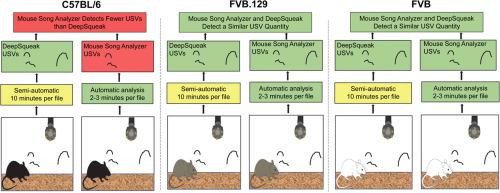Journal of Neuroscience Methods ( IF 3 ) Pub Date : 2021-09-09 , DOI: 10.1016/j.jneumeth.2021.109356 Matthew S Binder 1 , Zachary J Pranske 2 , Joaquin N Lugo 3

|
Background
Communication is an essential behavior in mammals. Alterations in communication (neonatal crying) characterize numerous human neurodevelopmental conditions. Mice produce communicative vocalizations, known as ultrasonic vocalizations, (USVs) that can be recorded. The Mouse Song Analyzer is an automated USV analysis system while DeepSqueak is a semi-automated USV detection system.
Method
We used data from, C57BL/6J, FVB.129, and FVB neonates to compare the reliability of DeepSqueak and the Mouse Song Analyzer across various acoustic variables.
Results
We found that both systems detected a similar quantity of USVs for FVB.129 and FVB mice. However, DeepSqueak detected more USVs for C57BL/6J mice. High correlations were found between systems for each strain. When assessing duration, Deepsqueak detected USVs of a longer duration then the Mouse Song Analyzer across all strains. A low correlation between systems for duration was found for FVB.129 mice, while high correlations were found for C57BL/6J and FVB mice. When assessing fundamental frequency, the Mouse Song Analyzer detected a higher frequency than DeepSqueak for FVB.129 mice, with no other differences present. High correlations between systems were found for C57BL/6J and FVB.129 mice, while a low correlation was found for FVB mice. We also assessed each system’s sensitivity and found that Deepsqueak was able to detect softer USVs than the Mouse Song Analyzer.
Conclusions
These findings demonstrate that the strain of mouse used significantly affects the reliability of USV analysis systems. However, our data also indicates that DeepSqueak is more reliable and accurate than the Mouse Song Analyzer due to its increased sensitivity.
中文翻译:

在 C57BL/6J、FVB.129 和 FVB 新生儿中评估 DeepSqueak 和 Mouse Song Analyzer 发声分析系统
背景
交流是哺乳动物的基本行为。交流的改变(新生儿哭闹)是许多人类神经发育状况的特征。小鼠会产生可记录的交流发声,称为超声波发声 (USV)。Mouse Song Analyzer 是一个自动化的 USV 分析系统,而 DeepSqueak 是一个半自动化的 USV 检测系统。
方法
我们使用来自 C57BL/6J、FVB.129 和 FVB 新生儿的数据来比较 DeepSqueak 和 Mouse Song Analyzer 在各种声学变量中的可靠性。
结果
我们发现两个系统检测到 FVB.129 和 FVB 小鼠的 USV 数量相似。然而,DeepSqueak 为 C57BL/6J 小鼠检测到了更多的 USV。在每个菌株的系统之间发现了高度相关性。在评估持续时间时,Deepsqueak 在所有品系中检测到持续时间比 Mouse Song Analyzer 更长的 USV。FVB.129 小鼠的系统持续时间相关性较低,而 C57BL/6J 和 FVB 小鼠的相关性较高。在评估基频时,Mouse Song Analyzer 检测到 FVB.129 小鼠的频率高于 DeepSqueak,没有其他差异。在 C57BL/6J 和 FVB.129 小鼠中发现系统之间的高相关性,而在 FVB 小鼠中发现了低相关性。
结论
这些发现表明,所使用的小鼠品系会显着影响 USV 分析系统的可靠性。然而,我们的数据也表明 DeepSqueak 比 Mouse Song Analyzer 更可靠和准确,因为它具有更高的灵敏度。


























 京公网安备 11010802027423号
京公网安备 11010802027423号